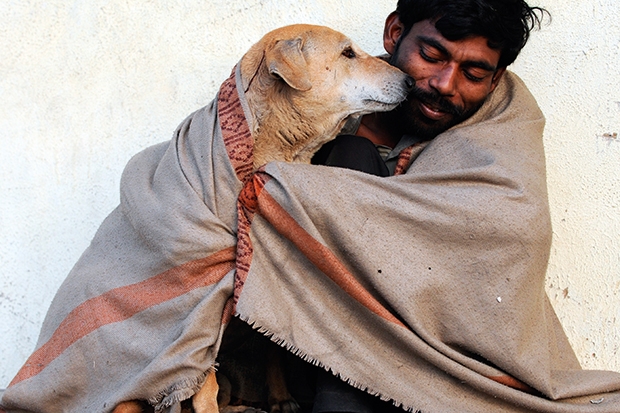Before I read this book, I thought I knew what a dog was. It barks, it wags its tail, it fetches sticks, it craps on the carpet. However, now that I’ve finished this learned tome, I realise there’s a bit more to it than I thought. As well as the domestic dog (Canis familiaris), the genus Canis also includes wolves, jackals, dingoes and coyotes. They all seem very different, yet domestic dogs can breed with all of them. According to Darwin, this makes them all members of the same species. Now can you see why I’m confused?
Raymond and Lorna Coppinger don’t want you to make a snap decision about what a dog is — or what it isn’t. They want to make you think about how zoologists classify things: why we decide to call an animal one thing and not another. For instance, in New England wolves are an endangered species, while coyotes are unprotected. Hence, when a new canid was discovered in New England, it was classified as a coyote, not a wolf.
A lot of Britons prefer dogs to people — a preference that becomes more rational the more dogs and people you meet — but, as the Coppingers point out, our romantic idea of man’s best friend is confined to a few rich countries, where people can afford effective vaccines against rabies and distemper. The vast majority of the world’s dogs are feral, not domestic. No wonder in poor countries they’re often regarded as filthy pests.
The Coppingers aren’t so concerned with pedigree dogs — ‘pure’ breeds created by artificial selection. They’re more interested in those dogs that live rough, out on the streets. Unlike pure breeds, which vary so dramatically, these ‘village dogs’ (as the Coppingers call them) are surprisingly similar the world over. From India to Africa, from South America to Southeast Asia, natural selection has produced the perfect scavenger (the village dog), just as it’s produced the perfect hunter (the wolf).
There are about one billion dogs in the world and 850 million of them are village dogs. Only 150 million are pure breeds, and most of these are very new (German shepherds were first bred as recently as the 1890s). We’ve bred a lot of pure breeds in a very short time (there are now more golden retrievers in the USA than there are wolves in the entire world) but if these pure breeds were returned to the wild they’d quickly disappear. Thanks to all the edible refuse we produce (well, edible for dogs, at any rate), the village dog is now the most prevalent canine strain throughout the world. And remarkably, they’re all pretty much the same size and shape.
As well as venturing off into the wilderness in search of data, Mr and Mrs Coppinger have travelled to lots of less exotic places, such as Mexico City’s municipal dump (‘a wonderful place to ask questions about the special relationship between dogs and people’). Although they’re clearly very keen on dogs (they even go dog-sledging together) there’s nothing sentimental about their approach. This is an easy book to read, but it’s still a serious academic study. The Coppingers are happy to debunk their own hypotheses when the facts they find don’t back them up.
They are eminent biologists, but they wear their learning lightly. Their writing is chatty and approachable. This cheerful book speaks with a single voice — it’s impossible to tell who wrote what. Their scientific findings are enlivened by a journalistic ear for human detail:
When we ask our Muslim friends, who don’t really like dogs and don’t keep pets, why don’t they cull their burgeoning population of street dogs, or even sick and diseased dogs, they answer, ‘We can’t. The dogs belong to God.’
If humans died out, dogs would vanish,village dogs as well as pure breeds. They’ve learnt to live alongside mankind, and without us, they wouldn’t stand a chance. ‘Dogs could not take up residence in the wild because that niche is already taken — by wolves, coyotes and jackals,’ explain the Coppingers:
The dog is a shape that has evolved to a new niche that was created when people switched from hunting and gathering to growing grain. The waste products of that activity created a food supply that supports village dogs.
So, according to the Coppingers, a dog is a kind of canid that has evolved to co-exist with humans — as a pet, a worker or a scavenger (or, in some cases, a combination of all three). Once they’ve spelt it out, it all seems fairly obvious. However, I never thought it through before, and now I see dogs in an entirely different light. Far from being a shameless stooge, Canis familiaris is actually a highly sophisticated scrounger. Seems man’s best friend is a lot smarter than we all imagined. Maybe the next stage of canine evolution will be a dog that can use a tin opener — or, even better, clear up its own crap.






Comments